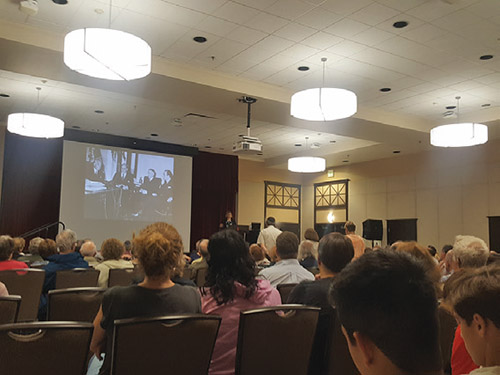

The War Refugee Board and America’s efforts to save the Jews of Europe was the topic of a recent presentation at the Douglass Student Center at Rutgers University by the university’s Bildner Center for the Study of Jewish Life. Dr. Rebecca Erbelding, a curator, historian and archivist at the United States Holocaust Memorial Museum, spoke about little-known facts and historical tales of President Franklin D. Roosevelt’s effort late in World War II to save the Jews who remained. Her book “Rescue Board: The Untold Story of America’s Efforts to Save the Jews of Europe” formed the basis of the presentation to the packed auditorium about the War Rescue Board (WRB), its creation and some of the amazing feats it performed. Getting people out of Nazi Germany included such actions as forging identity papers, recruiting spies, laundering money for bribes and sending food and money to underground organizations. The number of people saved has been estimated at about 126,000, with the exact number unknowable due to the large number of clandestine deals that took place.
Many people in the audience had no idea that anywhere close to that number of Jews were saved by a United States-based group. How is it possible that there is such a limited knowledge of the WRB? Erbelding said that even with the wealth of information about the Holocaust, information about the WRB is difficult to locate or organize. The story of the WRB disrupts the traditional narrative that the United States was completely apathetic to the plight of the Jews during this time period.
In 1942, Ross McClelland, an American working with a Quaker aid group at an internment camp in southern France, saw the first deportations to Auschwitz and knew they would mean certain death. When he brought the topic up with the Vichy government in France, he was told that his thoughts of wholesale murder of a segment of a population were absurd. And the government official added, if the United States was so interested in the plight of the Jewish people, why weren’t they bringing them into their country?
Bringing refugees into the United States during World War II was not an easy task. Strict laws were on the books limiting immigration. Many people were afraid to protest for fear that the anti-immigration laws would be made even stronger. Protesters massed across the country to try to sway the views of the president, and a group of 400 rabbis marched on Washington to bring attention to the plight of the Jews. The Treasury Department authorized the World Jewish Congress to send money to Switzerland to aid and assist Jewish refugees in 1943; however, the State Department refused to permit the money to leave the United States and even tried to suppress news about the extermination of the Jews to keep public opinion from changing current policy. Treasury Department lawyers met with then-President Roosevelt, who authorized the establishment of the War Refugee Board. Erbelding noted that this was “the only time in American history that the US government founded a non-military government agency to save the lives of civilians being murdered by a wartime enemy.”
Representatives of the WRB were often selected because they were “already there” in the country to which they were assigned. For example, a Bloomingdale’s executive with aspirations of becoming a diplomat was the WRB representative in Turkey. The WRB dropped leaflets and pamphlets that could be construed as propaganda.
The WRB coordinated efforts that appeared as if they were authorizing the purchase of refugees. Bribes and other means helped release many refugees. In one ruse intended to secure refugees’ release, high-ranking German military officers were told that the president of the United States was quite interested in the plight of refugees. After months of meetings, the Germans were tricked into releasing hundreds of Jewish refugees as “a symbol of good faith.”
The WRB had no cynical secondary mission to proselytize or do things for their own benefit. They were not even interested in whether the refugees brought to the United States became citizens. Their mission was only to save people.









